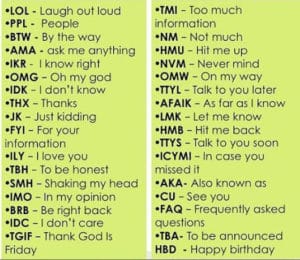By Annette Chrysostomou
Abbreviations are a part of our busy lives, and while they may be fun on social media and for texting, there is more to the story.
A popular abbreviation is one example.
Is ICMYI meaning ‘In Case You Missed It’ another new abbreviation? Depends what you call new, and certainly how old you are. According to news reports, ICYMI dates back to the year of Twitter’s birth, 2006, and that is what some young people may define as ancient. And of course abbreviations such as FYI are not even sooo yesterday but rather prehistoric, as it was coined around 1941.
In case you ‘missed it’, there is also FOMO, or for those who prefer to spell it out the ‘Fear Of Missing Out’, a feeling you should definitely have if you didn’t know what it meant. When you don’t understand a trendy abbreviation, it is hard to ask what it means, as one doesn’t want to appear ignorant and out of touch, though many social media encourage you to AMA (ask me anything)
Then, there is the possibility of a huge embarrassment if you get it wrong. In what was coined LOLgate, it was reported in 2012 that then UK prime minister David Cameron signed text messages to journalist Rebekah Brooks with LOL, thinking it meant ‘lots of love’ not ‘laughing out loud’. (The lots of love message didn’t help either)
But it can also be fun to be at the receiving end of an acronym or initialism.
“In the beginning especially, it was really cool, especially when someone sent you something that you hadn’t seen and had to figure out,” Maria Kyprianou, 23, a resident of Limassol, said about getting text messages with abbreviated words.
The original terms used by text message senders were borne out of necessity, because of the limit in the number of characters in the early versions of mobile phones.
When people started texting, for many there was another practical reason to keep words short, hence the use of abbreviations such as b4, as characters cost money. They still do, but, as one user put it “now with the use of What’sApp and other services there is more free text messaging available”.
They can come across as something other than cool though.
“I used to text pls and thxs, until I heard that someone thought about it as ‘if you can’t find the extra time to write a few more letters and write please and thanks then it is really impolite’,” said 55-year-old Anna Christou from Nicosia.

The internet and texting are not the only source of new abbreviations. Some old favourites came from broadcast media or popular shows, such as the 1940s radio show, ‘It’s That Man Again’ that became the source of TTFN or Ta Ta for now. Homer Simpson, a character from the popular TV series, ‘The Simpsons’ popularised the expression ‘doh’ or ‘duh’ to mean a comment on someone’s stupid or foolish action. It was so popular that it made it to the Oxford English Dictionary.
The subject isn’t just about media but has become part of our modern fast-moving world. As a journalist, I recently travelled to the European Commission in Brussels, where I attended a session on agriculture. Well, actually on CAP, which I already knew is Common Agricultural Policy. What I didn’t know, was that speakers use a plethora of other abbreviations, which may be basic to some, such as MS, but when an abbreviation is not defined just once in the beginning it may take a moment to understand that speakers are talking about Member States. Easy, since this was the EU Commission. It got harder when MFF kept cropping up, and it wasn’t until I had time to look it up that I understood they were talking about multi-annual financial framework. I got totally lost when the uses of the EAGF and the EAFRD were under discussion. For those who don’t know what these are, they stand for the ‘European Agricultural Guarantee Fund’ and ‘European Agricultural Fund for Rural Development’.
The whole session made me realise there is a whole ‘EU’ language out there, and when looking up Eurojargon on the internet, not surprisingly a list with hundreds and hundreds of abbreviations are posted, a list which is ridiculously long and which EU residents may find hard to grasp.
So what do you think or SWDYT? Do you prefer to shorten words or spell them out? Even if you want nothing to do with abbreviations, and you are the parent of an underage teenager, you might want to know enough to figure out when your underage teenager receives a message from someone with a message such as CU46.
Abbreviations vs acronyms
Abbreviations are often confused with acronyms. An acronym is an abbreviation formed from the initial letters of other words and pronounced as a word, such as Nasa. The FBI, on the other hand, is an example of initialism, an abbreviation where letters are pronounced separately. Both are abbreviations.


